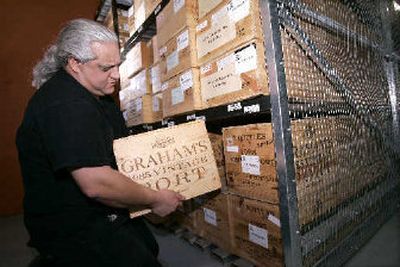Wine storage gets out of the cellar

JERSEY CITY, N.J. — As wine becomes a more popular American hobby, some collectors find they just don’t have enough space to store their cases of Bordeaux and California cabernet.
Americans are drinking more and better wines, experts say, so businesses are offering humidity- and temperature-controlled storage to a crowd of collectors that’s growing in number and sophistication.
“When you start buying wine, it sneaks up on you, and pretty soon you have run out of space,” said Tom Matthews, executive editor of Wine Spectator magazine, the bible for wine enthusiasts.
Business is so good at Fairfield, N.J.,-based LLK Enterprises that, even after it doubled its 10,000 square feet, the facility is full again. LLK, an affiliate of the New York wine shop Acker Merrall & Condit, hopes to triple its space in 2007, said storage director Tim Sharpe.
Customers often come from word of mouth, said Lars Neubohn, president of the three-year-old Wine Cellarage in the New York borough of the Bronx.
“It’s a niche business and there’s a lot of trust,” he said, walking past about 80 cases of Chateau Petrus.
Neubohn said he opened the business because the market was underserved and other storage companies weren’t run by “wine people.”
In his storage space, the temperature is set for 55 degrees and misters on the wall keep humidity between 60 percent and 80 percent. Customers monitor their collection through the company’s Web site, and Neubohn coordinates shipments from around the world.
“We’re very much like a bank. About $8 million to $10 million worth of wine is in this room,” he said. “Reputation is very important.”
Many wine storage companies are offshoots of moving companies, self-storage businesses and wine stores.
Guarantee Wine Storage in Jersey City, N.J., is a division of Moishe’s Moving, a well-known moving company in the New York area. The company began offering wine storage five years ago, adding to its businesses of document, art and data storage.
The 10,000-square foot space in a historic 85-year-old warehouse offers self-storage lockers or cases neatly stacked on shelves with a computerized inventory, said operations manager Shaul Shemish. The minimum charge is $80 monthly or $1.85 per case per month; most collectors store 200 bottles.
East Bank Wine Storage in Chicago grew out of a self-storage business. John Serratelli began storing 5,000 bottles there when he moved from a house with a cellar to a high-rise apartment building. The retired Dow Chemical executive preferred that the extra space in his Lake Shore Drive apartment go for a library and a bigger kitchen.
“It’s become much easier in recent years to find quality storage facilities,” he said. “Before that, you pretty much had to build your own, if you have a large house.
Even in markets with more space like California, collectors are concerned about humidity and temperature. Wine stored above 70 degrees ages quicker and can spoil. Humidity levels more than 80 percent can bring mold, while not enough humidity can cause the cork to dry out; exposure to oxygen also spoils wine.
“People are worried that it’s too hot,” said Paul Buonocore, manager of the 3 1/2-year-old Presidio Wine Bunkers in San Francisco.
Private collectors, restaurants and vineyards deposit bottles in the ammunition bunker of the former army base for its natural temperature control, he said.
Collectors use storage for various reasons. Jean Rawitt turned to the Wine Cellarage during a move. She and her husband keep about 15 cases in two refrigerated storage units in their apartment on Manhattan’s East Side, but they couldn’t squeeze in another three cases. They put those in storage.
“It’s a self-perpetuating activity,” said Rawitt, a fundraiser. “I think the more you learn, the more you want.”
Wine has increasingly become a part of American popular culture, said Sergio Esposito, owner of Italian Wine Merchants, a Manhattan wine store whose partners include restaurant superstars Mario Batali and Joe Bastianich.